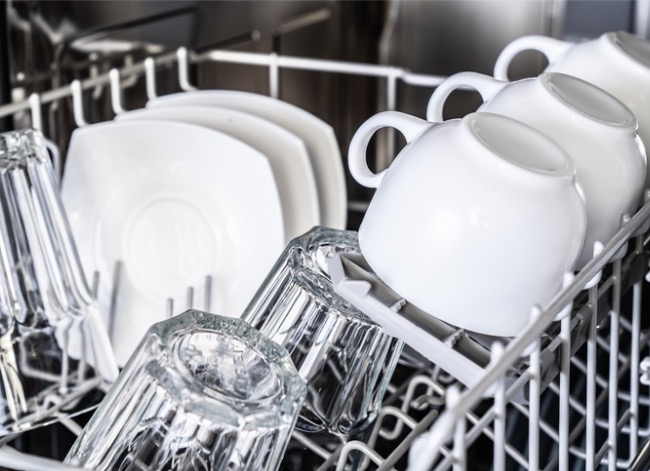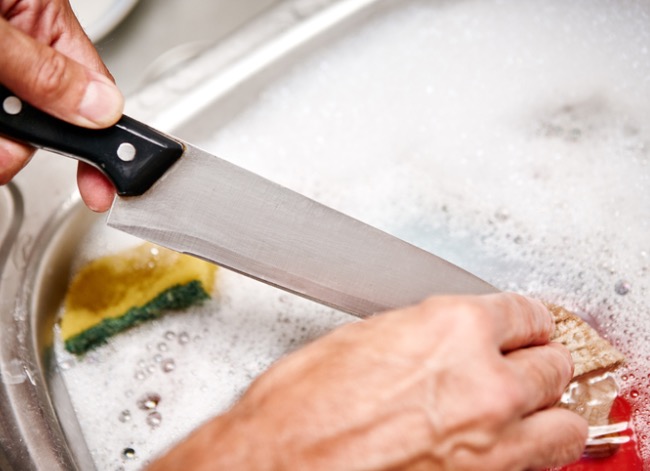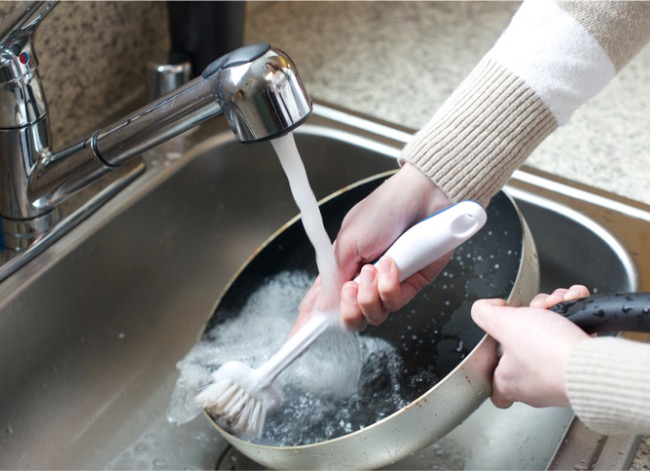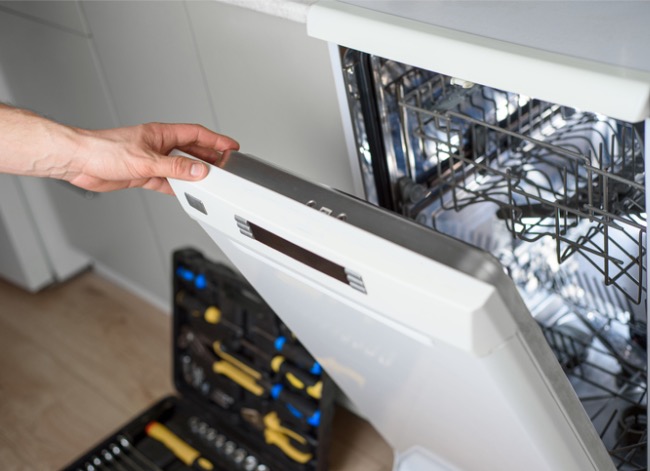We may earn revenue from the products available on this page and participate in affiliate programs. Learn More ›
When it comes to the debate between hand washing and using a dishwasher, it may surprise you to learn that there’s no simple answer in terms of which method is best. The reality is that both dishwashing methods have advantages and disadvantages. Many of us have outdated ideas of what dishwashers are capable of, but these appliances have come a long way since they became household fixtures in the 1970s.
Read on to learn more about the pros and cons of dishwashers and hand washing, as well as which method is ideal for a variety of situations.
Today’s dishwashers use less water than hand-washing.
In the past, dishwashers might have consumed 10 to 15 gallons of water per cycle. Modern dishwashers, on the other hand, are designed with water efficiency in mind. In fact, the Department of Energy mandates that full-sized dishwashers can use a maximum of 5 gallons of water per cycle. Energy Star-rated appliances require even lower water usage, at 3.5 gallons per cycle.
According to a study conducted by the University of Bonn in Germany, washing a full load of dishes by hand uses an average of more than 26 gallons of water. The study also found that handwashing techniques vary widely, with some people using just 8.7 gallons for the task and others using 116!
The average kitchen faucet has a flow rate of 2.2 gallons per minute, meaning that you’d only have two minutes to wash an entire dishwasher’s worth of dishes to match a dishwasher’s water efficiency. It would be nearly impossible to use less than 5 gallons of water to hand wash a full load of dishes
Another water-saving aspect of modern dishwashers is the fact that there’s also no need to pre-rinse your dishes. According to Consumer Reports, pre-rinsing your dishes can waste as much as 6,000 gallons of water each year. While today’s dishwashers don’t require pre-rinsing, it’s still prudent to scrape any food scraps into the trash or compost bin.

RELATED: Dishwasher vs. Hand Washing: When to Use Each Cleaning Method
Some items require hand-washing.
While using a dishwasher may be more energy- and water-efficient and will undoubtedly save you time, it’s not always an option. There are a number of commonly used kitchen items that aren’t dishwasher-friendly and must be washed by hand. Some examples include wood cutting boards, sterling silver flatware, cast iron cookware, chef’s knives, and non-stick pans. Some fine china and hand-made ceramic serving ware are also best washed by hand. Many people also have sentimental items that they don’t want to risk damaging in the dishwasher.

Dishwashers are more efficient for cleaning full loads.
Using a dishwasher undoubtedly saves time. According to Energy Star, using a dishwasher instead of handwashing for a year saves you an average of 230 hours of manual labor—or almost ten days!
This means that dishwashers are the obvious choice if you have a full load, but what if you have a small household that doesn’t produce enough dishes to run it frequently? If you find yourself only running your dishwasher every two or three days, it might be better to hand wash instead. That’s because food particles can dry out and become caked on if dishes sit for more than 24 hours before being cleaned. If this occurs, your dishwasher may not be able to remove the stuck-on grime.
RELATED: How to Load a Dishwasher the Right Way
You can target tough spots with hand-washing.
While dishwashers have a number of advantages, including using less water and saving time, there are some instances where they simply can’t compete with hand washing. One thing even the best dishwashers can’t do is scrub off stuck-on grime. If you happen to burn something to the bottom of a pot or a layer of rice becomes affixed to your saucepan, you’ll need a little elbow grease to clean it.

Dishwashers can be expensive to purchase and repair.
While using a dishwasher can save you money on your utility bills over time, one major downside to dishwashers is the initial price. While you can certainly find a dishwasher for under $500, budget models tend to be noisier and have a lower-quality build. A high-quality dishwasher costs between $500 and $2000 before you even factor in eventual repairs. Furthermore, some older homes and apartments aren’t designed with space for a dishwasher, so an entire kitchen renovation may be necessary in order to make space for one.
RELATED: The Best Dishwasher Rinse Aids

Hand-washing can be hard on your hands.
In order to kill bacteria, most dishwashers use high water temperatures of between 140 and 145 degrees Fahrenheit. Those high heats simply aren’t tolerable for most people when hand washing, so there may be some traces of bacteria left behind. Even at lower temperatures, washing dishes by hand can wreak havoc on your hands. Using water and dish soap can dry out your skin, and if you get regular manicures, you’ll know that their lifespan is shortened significantly when you wash dishes by hand. While wearing gloves is an option, you can also opt to simply put most of your dishes in the dishwasher instead to save water and your hands.


